

|
| weblog/wEssays archives | home | |
|
The China Syndrome--Financial Meltdown (March 28, 2007) Thank you J.H. for your generous and quite unexpected donation. I am honored by the support being offered by readers. All contributors are listed at the bottom of the page in acknowledgement of my gratitude. 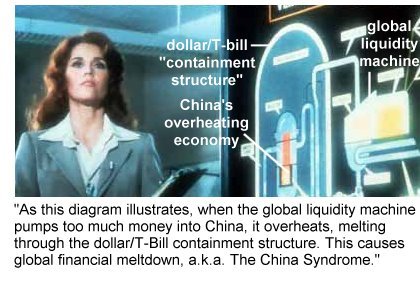 The 1979 film
The China Syndrome
The 1979 film
The China Syndrome(wikipedia entry on The China Syndrome) Nowadays, the idea that a consumer-spending meltdown in the U.S. could trigger a subsequent slowdown in China's red-hot economy is a given. But perhaps "The China Syndrome" works both ways, and a meltdown of China's speculative financial bubble will trigger a meltdown in the U.S.'s debt-driven speculative bubbles. To give you a taste of just how frenzied the Chinese stock market has become, consider this Bloomberg story sent in by frequent contributor U. Doran: 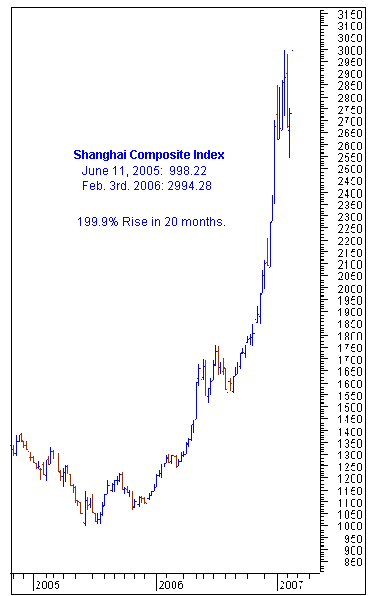
March 21 – Bloomberg (Luo Jun / Simon Pritchard):This chart illustrates the stupendous (and recent) rise of the Chinese stock market. It also poses three questions. 1. Is this sustainable? 2. How soon will it drop? 3. What effect will a sharp decline have on global financial markets? Question Three is easy to answer, for the late February swoon in the Chinese markets immediately sent global markets tumbling. 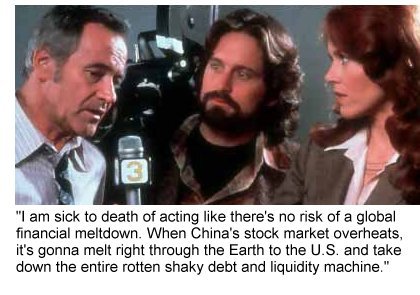
As for Question One, here's an article submitted by frequent contributor Albert T.: Hong Kong's stock market romance turns sour: "We like to buy shares, but when the nanny starts to give out investment tips, you know things have got a bit irrational," said Allan Chan, who like many Hong Kong residents likes to dabble in the market.Oh really? This statement is a laughably absurd denial of reality, for February's drop amply proved that China's markets can and will influence global markets. The reason is not the size of the Shanghai market or any technical reason; it's simply that the entire world knows that China has been the engine of global growth, sucking up vast quantities of raw materials, machine tools, consumer goods and capital. It has also been (along with Japan and the OPEC countries) the primary supporters of debt-loving American consumers' 6-year buying spree via the purchase of hundreds of billions of dollars of U.S. Treasury bonds, which has kept U.S. interest rates low and kept the dollar from plummeting even lower than it already has. If the party stops in China, it stops everywhere. All the strident babble in the media and in Congress about the dollar-yuan exchange rates fails to consider how deeply intertwined the U.S. and Chinese economies have become. It is nonsensical to think that an adjustment in the exchange rate is going to change much of anything; that would be the equivalent of moving a pawn one square forward on a 3-D chess board. While American politicos have focused on the trade imbalance to score easy points with confused constituents, they seem to have forgotten that the Chinese central bank owns at least $600 billion in U.S. Treasuries as well as other U.S. debt--including residential mortgage-backed securities: China's money woe: Where to park it all: 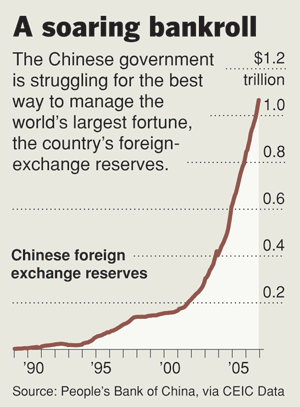
Most central banks have invested them in U.S. securities, mostly Treasury bonds, but sometimes mortgage-backed securities as well. In recent years, these giant purchases have helped hold down interest rates that American home buyers pay for mortgages and the U.S. government pays to finance its budget deficits.Albert T. also sent over this link to a story on China's slowing economy: Pace of Chinese growth 'to slow' The pieces are in place for a meltdown of China's speculative market. A speculative bubble in which people are betting credit card debt on a market which has jumped 200% in less than two years is clearly vulnerable to reversal. Underneath the speculative bubble, the real economy is slowing as officials seek to restrain risky lending and inflation. As China has expanded its U.S. debt holdings to include mortgage-backed securities, it has unwittingly exposed those holdings to the meltdown currently underway in the U.S. housing and mortgage-backed securities markets. Its vast horde of U.S. dollar-denominated Treasuries further exposes it to a decline in the dollar. And the entire $1.3 trillion portfolio is managed by woefully underpaid civil servants. On the U.S. side, our speculative markets are vulnerable to the slightest tremors in the Chinese markets, and to any re-shuffling of their dollar and Treasury holdings. It may come down to whose speculative financial "reactor" melts down first. The idea that one country's debts and bubbles can melt down without effecting the other is wishful thinking. 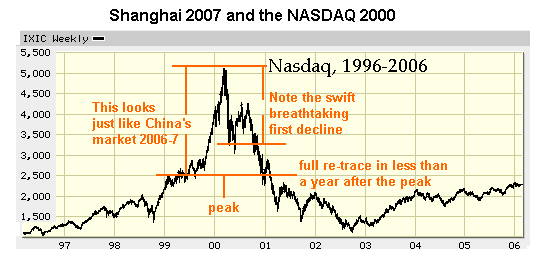
As for question Two, How soon will the Chinese market drop? Consider this chart of an eerily similar bubble--the NASDAQ circa the dot-com era. If this had any value to you. . . Your readership is greatly appreciated with or without a donation. For more on this subject and a wide array of other topics, please visit my weblog. copyright © 2007 Charles Hugh Smith. All rights reserved in all media. I would be honored if you linked this wEssay to your site, or printed a copy for your own use. |
||
| weblog/wEssays | home |